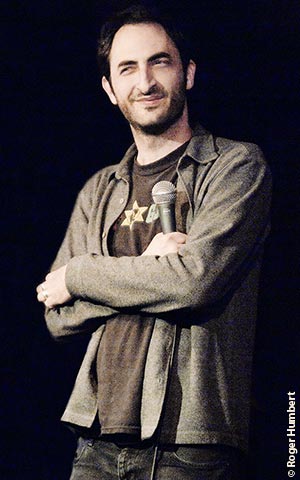|
A Song and a Prayer wasn’t just a wonderful evening of music including jazz, contemporary classical and Klezmer. Acting, visual art in motion, a variety of vocal styles within one person mind you, exceptional piano, clarinet and trumpet compositions with heartfelt execution beside a solid quartet, sometimes quintet, incredibly creative original compositions and arrangements were central to the performance. In short, it had it all.
Each concert I attend leaves me with a different emotion and the best are the ones that provoke thought, inspire me to reach and leave me with a greater understanding. This concert did all three. In fact, it has taken me a week to attempt to combine my disparate thoughts and feelings while reading through the large and extensive press kit provided.
|
|
So what would I like the reader to know about the evening’s events? First and foremost, there was absolutely no requirement to be Jewish or understand either Yiddish or German. This music transcended all consideration of culture and language due in large portion to one man.
David Wall is a consummate singer, actor, humourist and natural speaker. Each piece began with an explanation of what the audience was to experience, cleverly setting the mood of the music with the tone of his remarks. His well-developed vocal talents moved from cantorial ‘throat-singing’ to a folk style and humour reminiscent of Tom Lehrer, to a falsetto with absolutely no register transition. David Wall is now synonymous with “I must go to see this performance.”
Etymologically, Klezmer is from the Hebrew K’li zemer meaning musical instrument. In the 1400s groups of secular Jewish musicians playing dance songs for celebrations, became known as Kleyzmorim, evolving musical traditions dating back to Biblical times. During the last century, the word’s usage has changed, it now identifies a specific musical genre, also sometimes referred to as Freilech or Yiddish music.
Bringing traditional Klezmer to the performance and continuing its long-standing evolvement was the well-accomplished mission of these multi-talented musicians. Particular mention needs to be made of at least four of them.
|
|

David Wall (April 2006) |
|
|
Marilyn Lerner traversed the keyboard with the confidence and familiarity of the consummate pianist that she is, equally comfortable with many different styles and expressions of music. Trumpeter David Buchbinder’s playing is only exceeded by his ability as a composer. Martin Van de Ven playing clarinet and bass clarinet gave voice to humour, thought and reflection evident in his compositions and Wall’s lyrics based on the work of Toronto poet B. Merensky. Andrew Burashko sitting in at the piano for Sergei Prokofiev’s Overture on Hebrew Themes, Op. 34, with Lori Freedman’s clarinet added to the quartet, elevated the concert to even further diversify its aspirations.
The incredible thought, old magic and mystery so intricately enveloping the evening’s works, whether Prokofiev’s contemporary classical, occasional textures of Scott Joplin-like jazz or Ashkenazi klezmer, were not only enhanced by acting but by the unusual inclusion of what can be best described as visual art in motion and emotion.
Jarek Obsadny’s moving, whispering images were projected onto a filmy curtain drawn across half the stage. His composition, for that’s what it was, deserves the same consideration one gives to a special arrangement of music. The images of barren woodlands, floating clouds and moving visages gave emotional clarity to the music.
It was an evening of entertaining music comprising good musicians, hearing something new, humour, laughter, audience participation and foot-tapping fun. All of these were present but in addition, there was visual stimulation and yes, even a sing-along. This performance surely advanced artistic director Andrew Burasho’s stated mission of bringing classical and cultural music to wider audiences.
I not only encourage but implore readers to step out of their traditional musical genre and explore the music of diverse cultures. You may be surprised to discover the widespread influence and continuing relevancy of ethnic music, evolved over centuries and even, millennia
|


